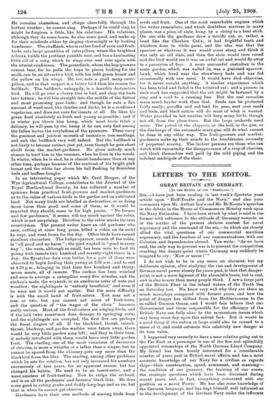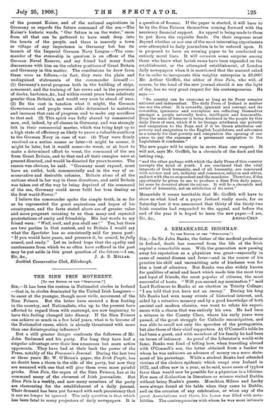LETTERS TO THE EDITOR.
GREAT BRITAIN AND GERMANY.
[To THE EDITOO OY THE " SPECTATOR." j SIR,—I have just been reading in last week's Spectator your article upon "Half-Truths and the Navy," and also your comments upon Mr. Arthur Lee's and Mr. McKenna's speeches in the debate in the House of Commons on Monday week upon the Navy Estimates. I have been struck by what is said in the former with reference to the attitude of Germany towards us in the matter of the present obvious contest for naval supremacy and the command of the sea,—to which are closely allied the vital questions of our commercial maritime supremacy, and the freedom of our communications with our Colonies and dependencies abroad. You write : "As we have said, the only way to prevent war is to prevent the competition reaching the danger-point where Germany may suddenly be tempted to cry : 'Now or never!'" I do not wish to be in any sense an alarmist, but my deliberate opinion, after studying the rise and development of German naval power closely for years past, is that that danger- point is not a mere figment of the alarmist's brain, but is real, and is also nearer than many people think. I saw a large part of the British Fleet in the inland waters of the North Sea on Saturday last. We know very well why they are there so much nowadays compared with former years, and how the point of danger has shifted from the Mediterranean to the so-called German Ocean, and I would fain believe that our Government and those responsible for the efficiency of the British Navy are fully alive to the momentous issues which may hang some day upon this salient fact. But it would be a good thing if the nation at large could also be roused to a sense of it, and could estimate this relatively new danger at its true value.
I happened very recently to have a near relative going out to the Far East as a passenger in one of the fine and splendidly appointed steamships of the North German Lloyd Company. My friend has been keenly interested for a considerable number of years past in British naval affairs, and has a most accurate knowledge of our Navy for a civilian as regards ships—their construction, speed, armament, and manning— the condition of our gunnery, the training of our crews, the strategic questions which have been discussed during recent years, and, in fact, everything connected with our position as a naval Power. He has also some knowledge of the German language, and has kept himself well informed as to the development of the German Navy under the influence
of the present Kaiser, and of the national aspirations in Germany as regards the future command of the sea.—The Kaiser's historic words, "Our future is on the water," seem from all that can be gathered to have sunk deep into the hearts of the people, and there is scarcely a town or village of any importance in Germany but has its branch of the Imperial German Navy League.—The com- mander of the steamship in question is an officer of the German Naval Reserve, and my friend had many frank discussions with him on the relative positions of Great Britain and Germany in this matter. The conclusions he drew from these were as follows,—in fact, they were the plain and undisguised statements of the commander himself :— (1) Germany's naval progress both in the building of ships, armament, and the training of her crews and in the provision of docks, harbours, &c., bad within recent years been relatively greater than Britain's, and would very soon be ahead of ours.
(2) 'Be the cost in taxation what it might, the German Government and people were alike determined to maintain and increase that rate of progress, and to make any sacrifices to that end. (3) This spirit was fully shared by commercial men, and, indeed, by all classes in Germany, and was strongly felt in their commercial marine, which was being kept up to a high state of efficiency as likely to prove a valuable auxiliary to the German Navy in case of war. (4) They were firmly resolved as a nation sooner or later—it might be sooner, it might be later, but it would come—to wrest, or at least to make a determined effort to wrest, the command of the sea from Great Britain, and to that end all their energies were at present directed, and would be directed for years to come. The reason was obvious, he said "Germany must expand, must have an outlet, both commercially and in the way of re- munerative and desirable colonies. Britain alone of all the nations stood in her way in these directions, and until Britain was taken out of the way by being deprived of the command of the sea, Germany could never fulfil her true destiny as the first world-Power."
I believe the commander spoke the simple truth, in so far as be represented the great aspirations and hopes of his countrymen, and the facts stated above are of greater value and more pregnant meaning to us than many and repeated protestations of amity and friendship. His last words to my friend were : "Wait, wait, and you shall see!" Yes, but there are two parties in that contest, and to Britain I would say What the Spectator has so consistently said for years past : " If you would have peace, and preserve it, be armed, be fully armed, and ready." Let us indeed hope that the apathy and carelessness from which we so often have suffered in the past may be put aside in this great question of the futnre.—I am, Sir, &c., J. A. S. MILLAR. Scottish Conservative Club, Edinburgh.







































 Previous page
Previous page